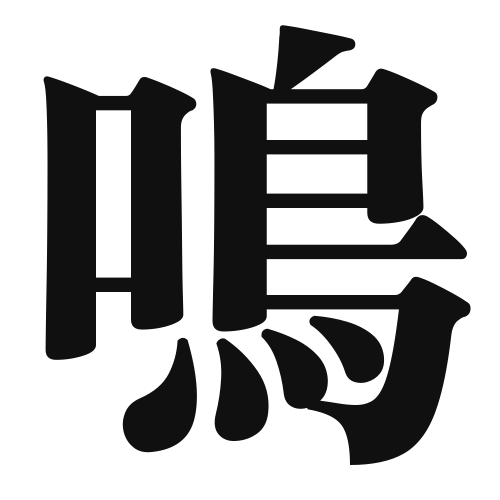1. Overview of Meaning
The kanji “鳴” (pronounced “naru” or “mei”) primarily means “to sound” or “to chirp.” It is often associated with the sounds made by animals, such as birds or insects, and can also refer to the ringing of bells or other similar sounds.
2. Formation and Radical
Formation of the Kanji: The kanji “鳴” is a phono-semantic compound (形声文字), which means it combines a phonetic component with a semantic component. The left part, “鳥” (bird), indicates the meaning related to animals, while the right part, “明” (bright), contributes to the pronunciation.
Radical: The radical of “鳴” is “鳥” (bird), which is commonly found in kanji related to birds and their sounds.
3. Examples of Usage
Common Words and Phrases: Some frequently used words that include “鳴” are:
- 鳴く (なく, naku) – to chirp or to cry (used for animals)
- 鳴る (なる, naru) – to ring or to sound
- 鳴き声 (なきごえ, nakigoe) – the sound made by an animal
Example Sentences in Daily Conversation:
- 鳥が鳴いています。 (とりがないています。) – The birds are chirping.
- 電話が鳴った。 (でんわがなった。) – The phone rang.
4. Synonyms and Antonyms
Similar Kanji: A kanji with a similar meaning is “響” (ひびく, hibiku), which means “to echo” or “to resonate.” While both kanji relate to sound, “響” emphasizes the quality of sound and its reverberation, whereas “鳴” focuses on the act of producing sound.
Antonyms: A kanji with an opposite meaning is “静” (しずか, shizuka), which means “quiet” or “silent.” This contrasts with “鳴,” as it refers to the absence of sound.
5. Cultural and Historical Background
Relation to Japanese Culture: The concept of sound in Japanese culture is significant, especially in traditional arts like Noh and Kabuki, where the sounds of instruments and voices play a crucial role. The sounds of nature, such as birds chirping, are often celebrated in Japanese poetry and literature.
Proverbs and Idioms: One common idiom is “鳴かぬなら鳴くまで待とう” (なかぬならなくまでまとう), which translates to “If the bird does not sing, wait until it does.” This reflects patience and the idea of allowing things to unfold in their own time.
